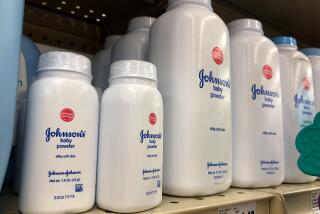Jury Issues Split Verdict in Marathon Toxic Exposure Trial
- Share via
Jurors rendered a split verdict Tuesday in the first phase of a marathon toxic exposure trial, ruling that Lockheed workers may proceed with injury claims against 10 of 20 chemical firms accused of failing to provide adequate warnings on the health risks of their products.
The verdict, which followed three weeks of deliberations in Los Angeles Superior Court, sets the stage for a final trial phase in which jurors will decide if the workers were harmed by chemicals supplied by the 10 companies, and if inadequate warnings were to blame.
The 3-month-old trial stems from claims by more than 600 Lockheed workers and involves dozens of chemical products--including solvents, primers and epoxies--used to build the Stealth fighter and other military aircraft at Lockheed’s Burbank manufacturing complex during the 1970s and ‘80s.
The workers, who are seeking unspecified damages, contend they suffered injuries ranging from eye and skin irritation to cancer because the chemical suppliers did not adequately explain the health risks or needed safety precautions.
Jurors, who waded through scores of questions on a 47-page verdict form, found that 10 of the 20 chemical suppliers, including industry giants DuPont and Ashland, were guilty of negligence for failing to provide adequate warnings in the material safety data sheets that accompanied shipments of their products.
The jury found that two of these companies--Dexter Corp. and J.T. Baker Inc.--also could be liable for punitive damages because their failures constituted “despicable conduct.”
The jury deadlocked on whether punitive damages could be sought against four other firms. In those cases, at least nine of 12 jurors agreed that the companies failed to provide adequate warnings, but fewer than nine could agree if they were liable for punitive damages. Lawyers for the workers could seek a retrial of the mistrial counts at a separate proceeding in the future.
The verdict removed the other 10 defendants from the second phase. Six of this group, including Arco, Shell and Unocal, were found to have supplied enough safety information. Jurors could not agree on the warnings provided by the others.
Both sides in the case declared victory. “It’s spectacular,” said Thomas V. Girardi, lead attorney for the workers.
“It’s a wonderful result. After 10 years of litigation, we have a decision that half of these chemical companies and oil companies are liable. . . . We’re very pleased.”
Said Robert H. McMillan, one of the chemical company lawyers, “This is a very poor showing on the part of the plaintiffs, because they certainly threw all they had at it.”
The result “confirms our general belief that the cases are without merit.”
Before collecting any damages, plaintiff lawyers must persuade jurors that the workers were injured by toxic exposure and would have taken adequate precautions if properly warned.
This second phase, which is to begin Monday, will be confined to the health claims of 14 “pilot” plaintiffs, although the result is likely to guide settlements with more of the workers.
After sending the jurors home, Judge Richard C. Hubbell addressed a courtroom full of lawyers, wondering aloud if the removal of many chemical products from the case weakens the claims of any of the 14 workers. He asked the lawyers to consider before Monday if a settlement is possible, advising them to “put your heads together with some private judge . . . and perhaps mediate this.”
More to Read
Inside the business of entertainment
The Wide Shot brings you news, analysis and insights on everything from streaming wars to production — and what it all means for the future.
You may occasionally receive promotional content from the Los Angeles Times.









